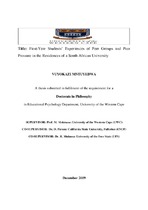First-Year Students’ Experiences of Peer Groups and Peer Pressure in the Residences of a South African University
Abstract
In general, peers have a tendency to influence others positively and negatively. In the main, transition from school to higher education causes some students to experience stress; to respond negatively to new conditions; and to engage in risk behaviour, which hinders epistemological access, negatively affects performance, and often delays graduation. Nonetheless, participation in peer group activities has advantages and potentialities, which are often neglected in popular scholarly discourse. The main research question of the study was to investigate the experiences of peer pressure among first-year students? This study adopted a mixed-method research design and presents findings for both quantitative data which was collected through an electronic survey and qualitative findings from focus group interviews with three different groups: females, males, and, mixed gender. The population comprised first-year students living in two residences of a selected South African university. The qualitative data was analysed through thematic analysis, while the quantitative data was analysed through descriptive statistics and inferential statistics such as Spearman’s Rank correlation was used in the study. In consideration with the transition theory, social learning theory, and student involvement theory. Findings reveal that first-year students join different groups and they encounter both positive and negative experiences. Positive experiences were observed in relation to academic performance and sense of belonging. Negative experiences indicate that peers influence others to adopt anti-social behaviour, experience undue materialistic pressure, have poor class attendance, and depend on peers for decisions. Overall, it is found that academic success depends on students’ interconnectedness, sense of belonging, peer support, acceptance, and recognition. The findings can be utilized to inform practical strategies and policies to empower first-year students to deal productively and progressively with peer pressure within the higher education sector. The study recommends the implementation of a First-year Student orientation programme which is called University 101 that can assist first-year students with better transition to higher education and can increase retention output. The programme should address the crucial areas that will assists the first-year with better transitions such as diversity, well-being, self-esteem, academic excellence and peer pressure.

